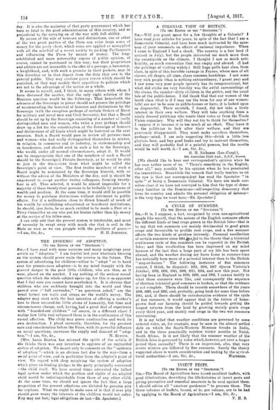A CYCLE OF SUMMERS.
(To roe EDITOR or THE " Encraon.") Son,—It is, I suppose, a fact, recognised by even non-agricultural people like myself, that the nature of the English summers affects the different kinds of food crops grown in the British Isles—that is to say that wet summers are mainly detrimental to good grain crops and favourable to prolific root crops, and a fine summer affects the two kinds of produce inversely. Personal recollection of certain summers since 18814as9led to the theory that a triennial continuous cycle of fine summers can be expected in the British Isles; and this recollection has been impressed on my mind because of the fact that a large part of my life has been spent abroad, and the weather during my leave home in summer-time has naturally been more of a personal interest than to the British " stay-at-homes." The following instances of fine summers cannot, I think, be dieputed: 1881, 1884, 1867 (Queen Victoria's Jubilee), 1899, 1896, 1E01, 1909, 1911, 1914, and now this year. Not having been in England in 1890, 1899, and 1902, I cannot testify to what those summers were like, and consequently the sequence of thirteen triennial good summers is broken, no that the evidence is not complete. There should be records somewhere of the years 1890, 1899, and 1902, and, probably, going back for some time before 1881, and, if there should be corroborative evidence of the cycle of fine summers, it would appear that in the future of home- grown food our farming should be guided towards getting the largest returns from the land by growing mainly grain crops every third year, and mainly root crops in the two wet summers intervening.
It is my belief that weather conditions are governed by some ordered rules, as, for example, may be seen in the almost settled date on which the South-Western Monsoon breaks in India, and in the three practically rainless winter months in Natal, South Africa. Is it not likely that the summer weather of the British Isles is governed by roles whickhowever,act over a longer period than annually? There is an impression, also, that very severe winters are followed by fine summers. Surely the theory suggested above is worth consideration and testing by the agricul-
tural authorities.—I am, Sir, Ac., Ws:roma.


























 Previous page
Previous page